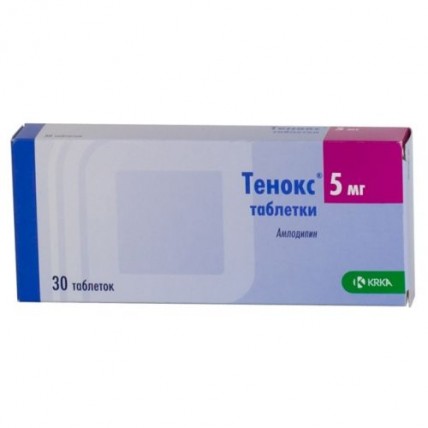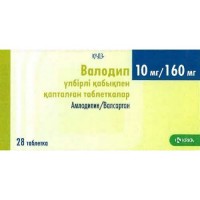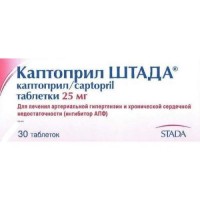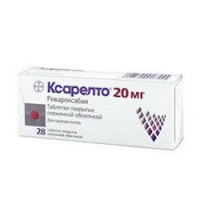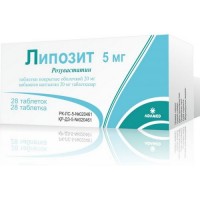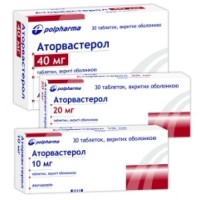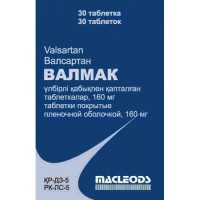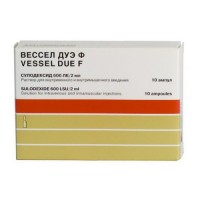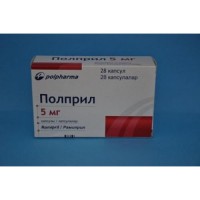The instruction for use of medicine for experts
of TEHOKC (TENOX)
the Trade name
of Tenoks
the International unlicensed
name Amlodipin Lekarstvennaya a form
of the Tablet of 5 mg and 10 mg
Structure
One tablet contains
active agent - amlodipin 5 or 10 mg in the form of an amlodipin of a maleate
excipients: microcrystalline cellulose, prezhelatinizirovanny starch, sodium starch glycollate, colloidal anhydrous silicon, magnesium stearate.
The description
Round, biconvex tablets, white color with slanted edge and a notch on one party.
Pharmacotherapeutic group
Selection blockers of slow calcium channels with primary influence on vessels. Dihydropyridinic derivatives
the Code of automatic telephone exchange C08CA01
the Pharmacological
Pharmacokinetics Later properties of oral administration amlodipin is slowly absorbed from digestive tract. The average absolute bioavailability is 64%, the maximum concentration in blood serum is observed in 6-9 hours. Food does not influence absorption of an amlodipin. Linking with proteins of plasma makes 95% that patients need to consider when prescribing drug with disproteinemias (perhaps significant increase in their free fraction). Amlodipin is slowly metabolized in a liver up to 90%, with formation of inactive metabolites.
Elimination half-life varies from 31 to 48 hours. About 60% of the accepted dose are excreted with urine, 20-25% with a stake, the rest (about 10%) in an invariable look.
The pharmacodynamics
of Tenoks belongs to group of drugs of the calcium channels called blockers. Drug inhibits current of calcium ions in cells of vessels and a cardiac muscle. Causes vasodilatation, reduces peripheric vascular resistance and reduces blood pressure. Hypotensive action is caused by direct vazodilatiruyushchy impact on unstriated muscles of vessels. Reduces degree of a hypertrophy of a myocardium of a left ventricle, has anti-atherosclerotic and cardiotyre-tread effect at an ischemic heart disease. The blood stream and supply of a cardiac muscle with oxygen improve that is necessary for prevention of attacks of stenocardia. At a diabetic nephropathy does not increase severity of a microalbuminuria. Has no adverse impact on carbohydrate and lipidic exchanges. Tinox is used for treatment of the increased blood pressure and prevention of the pains in a thorax resulting from insufficient blood supply of a cardiac muscle. Drug does not lead to immediate pain relief at stenocardia attacks.
Indications
- arterial hypertension (monotherapy or in a combination sdrugy
antihypertensive drugs)
- stable or vasospastic stenocardia (
Printsmetal's stenocardia)
the Route of administration and doses
Inside, the initial dose for treatment of arterial hypertension and stenocardia makes 5 mg of drug of 1 times a day. The dose as much as possible can be increased up to 10 mg once in day. In arterial hypertension the maintenance dose can be 2.5 5 mg a day.
In an angina of exertion and vasospastic stenocardia of 5-10 mg a day, once. For prevention of attacks of stenocardia of 10 mg/days.
To thin patients, patients of low growth, elderly patients, the patient with an abnormal liver function as antihypertensive, Tenoks appoint in an initial dose 2.5 mg, as anti-anginal means of 5 mg.
Change of a dose at co-administration with thiazide diuretics, beta blockers and inhibitors of angiotensin-converting enzyme is not required. Change of a dose is not required from patients with a renal failure.
Side effects
- heartbeat, short wind, the profound lowering of arterial pressure, a faint, a vasculitis, puffiness of anklebones and feet, rushes of blood to the person is rare: disturbances of a rhythm (bradycardia, ventricular tachycardia, an atrial flutter), thorax pain, orthostatic hypotension, development or aggravation of heart failure, premature ventricular contraction, migraine
- a headache, dizziness, fatigue, drowsiness, change of mood, a spasm, it is rare: a loss of consciousness, a hypesthesia, nervousness, paresthesias, a tremor, vertigo, an asthenia, an indisposition, insomnia, a depression, extraordinary dreams, an ataxy, apathy, agitation, amnesia
- nausea, vomiting, pains in epigastriums, it is rare: the increase in level of hepatic transaminases and jaundice (caused by a cholestasia), pancreatitis, dryness in a mouth, a meteorism, a hyperplasia of gums, a constipation or diarrhea, gastritis, increase in appetite
- a skin itching, rash (including erythematic, makulopapulezny rash, a small tortoiseshell), a Quincke's disease
- is rare: a pollakiuria, painful desires on urination, a nocturia, disturbance of sexual function (including decrease in potency), a dysuria, a polyuria
- it is rare: an arthralgia, arthrosis, myalgia (at prolonged use), a myasthenia
- it is rare: the gynecomastia, a polylithemia, increase/decrease in body weight, thrombocytopenia, a leukopenia, a hyperglycemia, a disorder of vision, konjyuktivit, a diplopia, eye pain, a ring in ears, a dorsodynia, dispnoe, nasal bleeding, the increased sweating, thirst, cold clammy sweat, cough, rhinitis, a parosmiya, disturbance of flavoring feelings, accommodation disturbance, a xerophthalmia
- is very rare: xerodermia, alopecia, dermatitis, purpura, discoloration of skin.
Contraindications
- hypersensitivity to an amlodipin and other derivatives
of dihydropyridine
- heavy arterial hypotension
- collapse, cardiogenic shock
- pregnancy and the period of a lactation
- age up to 18 years
with care appoint at:
- an abnormal liver function
- a sick sinus syndrome (profound bradycardia,
tachycardia)
- dekompensirovanny chronic heart failure
- slight or moderate arterial hypotension
- an aortal stenosis, a mitral stenosis
- a hypertrophic subaortic stenosis
- an acute myocardial infarction (and within 1 month after).
Medicinal interactions
Inhibitors of microsomal oxidation increase concentration of an amlodipin in blood plasma, increasing risk of development of side effects, and inductors of microsomal enzymes of a liver reduce concentration of an amlodipin.
Hypotensive effect non-steroidal anti-inflammatory drugs, especially indometacin (a delay of sodium and blockade of synthesis of prostaglandins kidneys), alpha adrenostimulyatory weaken, estrogen (sodium delay), sympathomimetics. Thiazide and loopback diuretics, beta blockers, verapamil, inhibitors of angiotenziprevrashchayushchy enzyme and nitrates enhance anti-anginal and hypotensive effects.
Amiodaronum, quinidine, alfa1-adrenoblockers, antipsychotic medicines (neuroleptics) and blockers of slow calcium channels can strengthen hypotensive action.
Does not influence pharmacokinetic parameters of digoxin and warfarin.
At combined use with drugs of lithium strengthening of manifestations of their neurotoxicity (nausea, vomiting, diarrhea, an ataxy, a tremor, sonitus) is possible.
Drugs of calcium can reduce effect of blockers of slow calcium channels.
The procaineamide, quinidine and other medicines causing lengthening of an interval of QT enhance negative effect and can increase risk of considerable lengthening of an interval of QT.
The pharmacokinetics of an amlodipin does not change at co-administration with Cimetidinum.
Grapefruit juice can reduce concentration of an amlodipin in blood plasma, however this decrease is not enough that considerably does not change action of an amlodipin.
Special instructions
during treatment by Tenoks the control of body weight and consumption of sodium, purpose of the corresponding diet (sodium consumption control) is necessary. Maintenance of hygiene of teeth and frequentation of the stomatologist (prevention of morbidity, bleeding and growth of gums) is necessary. At elderly patients the elimination half-life and clearance of drug can be extended. The dosing mode for elderly same, as well as for patients of other age groups. In liver diseases the dose of an amlodipin needs to be reduced.
At increase in a dose the observation of elderly patients is necessary. Despite the absence of at blockers of slow calcium channels of a withdrawal, before the termination of treatment the gradual reduction of a dose is recommended.
Features of influence of medicine on ability to run the vehicle or potentially dangerous mechanisms
In an initiation of treatment can arise drowsiness and dizziness. At their emergence it is necessary to observe special precautionary measures during the driving and work with mechanisms.
Overdose
Symptoms: profound lowering of arterial pressure, tachycardia, excessive peripheral vazodilatation, tachycardia.
Treatment: gastric lavage, activated carbon, maintenance of function of a cardiovascular system, control of indicators of function of heart and lungs, sublime position of extremities, control of volume of the circulating blood and a diuresis. For restoration of a tone of vessels use of vasoconstrictive drugs (in the absence of contraindications to their use), for elimination of consequences of blockade of calcium channels intravenous administration of a gluconate of calcium. The hemodialysis is inefficient.
A form of release and packing
of the Tablet on 5 and 10 mg. On 10 tablets in the blister, 3 or 9 blisters in a cardboard pack together with the instruction for use.
To Store storage conditions at a temperature not higher than + 30C.
To store out of children's reach!
2 years
not to use an expiration date after the expiry date specified on packing.
Prescription status
According to the prescription
the Producer
of KRK, of, the place, Shmaryeshka of tsest 6, 8501 Is new, Slovenia
To develop
of TEHOKC (TENOX)
the Trade name
of Tenoks
the International unlicensed
name Amlodipin Lekarstvennaya a form
of the Tablet of 5 mg and 10 mg
Structure
One tablet contains
active agent - amlodipin 5 or 10 mg in the form of an amlodipin of a maleate
excipients: microcrystalline cellulose, prezhelatinizirovanny starch, sodium starch glycollate, colloidal anhydrous silicon, magnesium stearate.
The description
Round, biconvex tablets, white color with slanted edge and a notch on one party.
Pharmacotherapeutic group
Selection blockers of slow calcium channels with primary influence on vessels. Dihydropyridinic derivatives
the Code of automatic telephone exchange C08CA01
the Pharmacological
Pharmacokinetics Later properties of oral administration amlodipin is slowly absorbed from digestive tract. The average absolute bioavailability is 64%, the maximum concentration in blood serum is observed in 6-9 hours. Food does not influence absorption of an amlodipin. Linking with proteins of plasma makes 95% that patients need to consider when prescribing drug with disproteinemias (perhaps significant increase in their free fraction). Amlodipin is slowly metabolized in a liver up to 90%, with formation of inactive metabolites.
Elimination half-life varies from 31 to 48 hours. About 60% of the accepted dose are excreted with urine, 20-25% with a stake, the rest (about 10%) in an invariable look.
The pharmacodynamics
of Tenoks belongs to group of drugs of the calcium channels called blockers. Drug inhibits current of calcium ions in cells of vessels and a cardiac muscle. Causes vasodilatation, reduces peripheric vascular resistance and reduces blood pressure. Hypotensive action is caused by direct vazodilatiruyushchy impact on unstriated muscles of vessels. Reduces degree of a hypertrophy of a myocardium of a left ventricle, has anti-atherosclerotic and cardiotyre-tread effect at an ischemic heart disease. The blood stream and supply of a cardiac muscle with oxygen improve that is necessary for prevention of attacks of stenocardia. At a diabetic nephropathy does not increase severity of a microalbuminuria. Has no adverse impact on carbohydrate and lipidic exchanges. Tinox is used for treatment of the increased blood pressure and prevention of the pains in a thorax resulting from insufficient blood supply of a cardiac muscle. Drug does not lead to immediate pain relief at stenocardia attacks.
Indications
- arterial hypertension (monotherapy or in a combination sdrugy
antihypertensive drugs)
- stable or vasospastic stenocardia (
Printsmetal's stenocardia)
the Route of administration and doses
Inside, the initial dose for treatment of arterial hypertension and stenocardia makes 5 mg of drug of 1 times a day. The dose as much as possible can be increased up to 10 mg once in day. In arterial hypertension the maintenance dose can be 2.5 5 mg a day.
In an angina of exertion and vasospastic stenocardia of 5-10 mg a day, once. For prevention of attacks of stenocardia of 10 mg/days.
To thin patients, patients of low growth, elderly patients, the patient with an abnormal liver function as antihypertensive, Tenoks appoint in an initial dose 2.5 mg, as anti-anginal means of 5 mg.
Change of a dose at co-administration with thiazide diuretics, beta blockers and inhibitors of angiotensin-converting enzyme is not required. Change of a dose is not required from patients with a renal failure.
Side effects
- heartbeat, short wind, the profound lowering of arterial pressure, a faint, a vasculitis, puffiness of anklebones and feet, rushes of blood to the person is rare: disturbances of a rhythm (bradycardia, ventricular tachycardia, an atrial flutter), thorax pain, orthostatic hypotension, development or aggravation of heart failure, premature ventricular contraction, migraine
- a headache, dizziness, fatigue, drowsiness, change of mood, a spasm, it is rare: a loss of consciousness, a hypesthesia, nervousness, paresthesias, a tremor, vertigo, an asthenia, an indisposition, insomnia, a depression, extraordinary dreams, an ataxy, apathy, agitation, amnesia
- nausea, vomiting, pains in epigastriums, it is rare: the increase in level of hepatic transaminases and jaundice (caused by a cholestasia), pancreatitis, dryness in a mouth, a meteorism, a hyperplasia of gums, a constipation or diarrhea, gastritis, increase in appetite
- a skin itching, rash (including erythematic, makulopapulezny rash, a small tortoiseshell), a Quincke's disease
- is rare: a pollakiuria, painful desires on urination, a nocturia, disturbance of sexual function (including decrease in potency), a dysuria, a polyuria
- it is rare: an arthralgia, arthrosis, myalgia (at prolonged use), a myasthenia
- it is rare: the gynecomastia, a polylithemia, increase/decrease in body weight, thrombocytopenia, a leukopenia, a hyperglycemia, a disorder of vision, konjyuktivit, a diplopia, eye pain, a ring in ears, a dorsodynia, dispnoe, nasal bleeding, the increased sweating, thirst, cold clammy sweat, cough, rhinitis, a parosmiya, disturbance of flavoring feelings, accommodation disturbance, a xerophthalmia
- is very rare: xerodermia, alopecia, dermatitis, purpura, discoloration of skin.
Contraindications
- hypersensitivity to an amlodipin and other derivatives
of dihydropyridine
- heavy arterial hypotension
- collapse, cardiogenic shock
- pregnancy and the period of a lactation
- age up to 18 years
with care appoint at:
- an abnormal liver function
- a sick sinus syndrome (profound bradycardia,
tachycardia)
- dekompensirovanny chronic heart failure
- slight or moderate arterial hypotension
- an aortal stenosis, a mitral stenosis
- a hypertrophic subaortic stenosis
- an acute myocardial infarction (and within 1 month after).
Medicinal interactions
Inhibitors of microsomal oxidation increase concentration of an amlodipin in blood plasma, increasing risk of development of side effects, and inductors of microsomal enzymes of a liver reduce concentration of an amlodipin.
Hypotensive effect non-steroidal anti-inflammatory drugs, especially indometacin (a delay of sodium and blockade of synthesis of prostaglandins kidneys), alpha adrenostimulyatory weaken, estrogen (sodium delay), sympathomimetics. Thiazide and loopback diuretics, beta blockers, verapamil, inhibitors of angiotenziprevrashchayushchy enzyme and nitrates enhance anti-anginal and hypotensive effects.
Amiodaronum, quinidine, alfa1-adrenoblockers, antipsychotic medicines (neuroleptics) and blockers of slow calcium channels can strengthen hypotensive action.
Does not influence pharmacokinetic parameters of digoxin and warfarin.
At combined use with drugs of lithium strengthening of manifestations of their neurotoxicity (nausea, vomiting, diarrhea, an ataxy, a tremor, sonitus) is possible.
Drugs of calcium can reduce effect of blockers of slow calcium channels.
The procaineamide, quinidine and other medicines causing lengthening of an interval of QT enhance negative effect and can increase risk of considerable lengthening of an interval of QT.
The pharmacokinetics of an amlodipin does not change at co-administration with Cimetidinum.
Grapefruit juice can reduce concentration of an amlodipin in blood plasma, however this decrease is not enough that considerably does not change action of an amlodipin.
Special instructions
during treatment by Tenoks the control of body weight and consumption of sodium, purpose of the corresponding diet (sodium consumption control) is necessary. Maintenance of hygiene of teeth and frequentation of the stomatologist (prevention of morbidity, bleeding and growth of gums) is necessary. At elderly patients the elimination half-life and clearance of drug can be extended. The dosing mode for elderly same, as well as for patients of other age groups. In liver diseases the dose of an amlodipin needs to be reduced.
At increase in a dose the observation of elderly patients is necessary. Despite the absence of at blockers of slow calcium channels of a withdrawal, before the termination of treatment the gradual reduction of a dose is recommended.
Features of influence of medicine on ability to run the vehicle or potentially dangerous mechanisms
In an initiation of treatment can arise drowsiness and dizziness. At their emergence it is necessary to observe special precautionary measures during the driving and work with mechanisms.
Overdose
Symptoms: profound lowering of arterial pressure, tachycardia, excessive peripheral vazodilatation, tachycardia.
Treatment: gastric lavage, activated carbon, maintenance of function of a cardiovascular system, control of indicators of function of heart and lungs, sublime position of extremities, control of volume of the circulating blood and a diuresis. For restoration of a tone of vessels use of vasoconstrictive drugs (in the absence of contraindications to their use), for elimination of consequences of blockade of calcium channels intravenous administration of a gluconate of calcium. The hemodialysis is inefficient.
A form of release and packing
of the Tablet on 5 and 10 mg. On 10 tablets in the blister, 3 or 9 blisters in a cardboard pack together with the instruction for use.
To Store storage conditions at a temperature not higher than + 30C.
To store out of children's reach!
2 years
not to use an expiration date after the expiry date specified on packing.
Prescription status
According to the prescription
the Producer
of KRK, of, the place, Shmaryeshka of tsest 6, 8501 Is new, Slovenia
To develop
